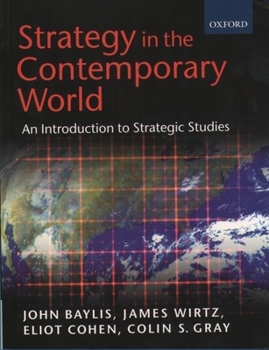Strategy in the Contemporary World: An Introduction to Strategic Studies
Strategy in the Contemporary World focuses on the traditional and contemporary uses of organized force for political ends. It brings together major scholars in the field and deals with both the theory and practice of strategy. Highlighting the continuing relevance of both traditional and new thinking about strategy, the text helps to clarify the complex issues of war and peace at the beginning of the twenty-first century.
The editors' introduction...
Format:Paperback
Language:English
ISBN:019878273X
ISBN13:9780198782735
Release Date:March 2002
Publisher:Oxford University Press, USA
Length:376 Pages
Weight:1.55 lbs.
Dimensions:0.8" x 9.5" x 7.4"
Customer Reviews
1 rating
Useful introduction to strategic studies
Published by Thriftbooks.com User , 22 years ago
This introductory textbook of strategic studies covers four main themes: the enduring issues of strategy, the evolution of joint warfare, twentieth-century theories, and contemporary issues of grand strategy. The book is written from the perspective of `Western security interests', but even so, studying strategy helps us to think clearly about the ways in which states and others use organised force for political ends. The writers all refute technological determinism: new weapons - artillery in World War One, tanks in World War Two, guided missiles in the Arab-Israeli war of 1973, precision bombing and superior ground force technology in the Gulf War - were none of them unbeatable. They show that the basic principles of conducting land warfare have hardly changed in the last hundred years. Armies need to combine their arms, defend in depth, keep large reserves, use cover and concealment, and integrate movement and suppressive fire. In particular, Stephen Biddle shows that, contrary to many claims, the USAF air war in the Gulf did not destroy all the Iraqi armour. Possibly 4,100 armoured vehicles later fought the US ground forces, but they did not fight according to the basic principles, so they were beaten. However, the editors err in dividing what they call `20th-century theories' - deterrence, arms control, terrorism and `irregular warfare' (national liberation struggles) - from the `contemporary issues' of technology, weapons of mass destruction, and humanitarian intervention. These are all still live issues. Further, the editors could have presented them in the livelier form of debates. As with any collection of pieces by many hands, the quality is uneven, but generally the better essays are more grounded in the realities of 20th-century military history. The worse ones try to discuss, for instance, the causes of war in terms of biology or psychology. As a rule, strikingly individual expressions of one person's views, like Colin Gray's Modern Strategy, or Bernard Brodie's War and Politics, provoke more thought than compilation textbooks






